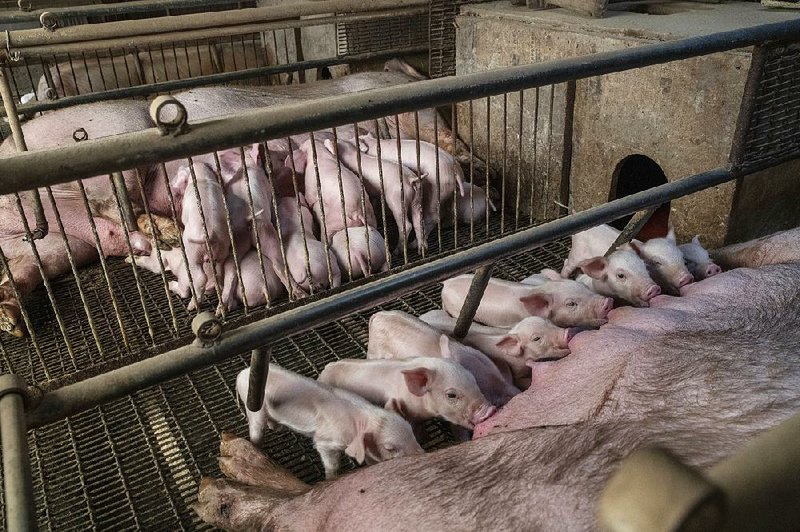BEIJING -- Things that keep China's top leaders up at night: a stalling economy, a bruising trade war and, increasingly, pigs.
Specifically, a shortage of pigs, which is fast becoming a national crisis.
The price of pork has been rising for months and it is now nearly 50% higher than it was a year ago, data published last week showed. Consumers are frustrated, and officials are quietly expressing alarm as they fight the outbreak of a disease that is devastating the country's pig population and causing the shortage.
China's premier, Li Keqiang, and the country's top governing body have called for "an attitude of urgency" to deal with the problem. Another top official last month labeled the problem a "national priority." At least three local governments have tapped the country's strategic pork reserves to ensure that consumers can keep eating the meat without breaking the bank, according to local news reports.
Even with these measures, consumers are being hit hard at a time when grocery bills are already going up thanks to the trade war with the United States.
"Too expensive, too expensive, too expensive! We can't afford it," said Gui Fuyi, a 69-year-old retiree who was browsing the meat section of a Beijing supermarket recently. These days, Gui buys only ground pork for wrapping into dumplings, not whole cuts.
China last week released consumer price inflation figures that illustrated the growing burden on shoppers. Food costs rose by 10% in the past year, the numbers showed, an increase made worse by trade tensions that have resulted in steep tariffs on agricultural products and livestock feed from the United States.
"The Chinese government always likes to say that China can tolerate any pain and repercussions from the trade conflict," said Victor Shih, an associate professor at the University of California, San Diego, and an expert on the Chinese economy. "But what they neglect to say is that it is the people who are bearing the brunt of the pain."
China has publicly said that the trade war with the United States will not affect its pork supply. But with the most recent tariffs, which went into effect Sept. 1, China now imposes extra taxes on American products, including soybeans, pork, seafood and crude oil.
As officials brace for steeper price increases -- analysts are estimating that pork prices could end the year at double their level from 2018 -- the challenge for Beijing is becoming more serious.
For more than a year now, China has fought to contain a vicious epidemic of African swine fever, a highly contagious disease that is harmless to humans but kills nearly every pig it infects. The Chinese government declared its first outbreak in August 2018, and since then cases have been reported in all of the country's provinces.
In response, authorities have ordered farmers not to feed pigs kitchen waste, a major channel through which the disease, which can survive for days in feces and uncooked meat, has spread to healthy populations. Officials have imposed quarantines and transport restrictions in places where the disease has been found. The police have arrested people for trading infected pigs.
But safety and hygiene standards have been tough to enforce across the millions of small backyard farms where most of China's swine are raised. The government says that 1.2 million pigs have been culled so far to try to halt the disease's spread, which is a tiny fraction of the 700 million pigs that were slaughtered in China last year.
Many livestock analysts say the official numbers do not begin to capture the seriousness of the epidemic.
Farmers and industry observers in China say that large numbers of African swine fever cases have gone unreported to authorities, and that many infected pigs end up sold into the market as a result. In some instances, farmers say, local officials have been slow or reluctant to acknowledge infections found in their herds.
The disease has already crossed the Chinese border into Vietnam, Mongolia and North Korea. Other Asian countries are on high alert.
As pork prices rise and Chinese families prepare for several big holidays, local officials have started to find creative ways to try to tamp down anxieties.
In the eastern city of Wenzhou, the city government has said it has enough frozen pork in reserve to give each resident 1.76 ounces a day for four days. In the southern city of Nanning, residents have been told they can buy up to 2.2 pounds of pork a day for a discounted price. The government in the southern province of Guangdong has pledged to release more than 3,100 tons of frozen pork, according to the local news media.
China's central government has also announced a raft of measures to encourage farmers to begin raising pigs again, including subsidies for building or expanding farms. Some subsidies offer as much as $700,000 to those who take up the charge.
But with African swine fever still being discovered in parts of the country, a boom in hog rearing could simply give the disease new herds to infect and fresh opportunities to spread.
SundayMonday Business on 09/15/2019
